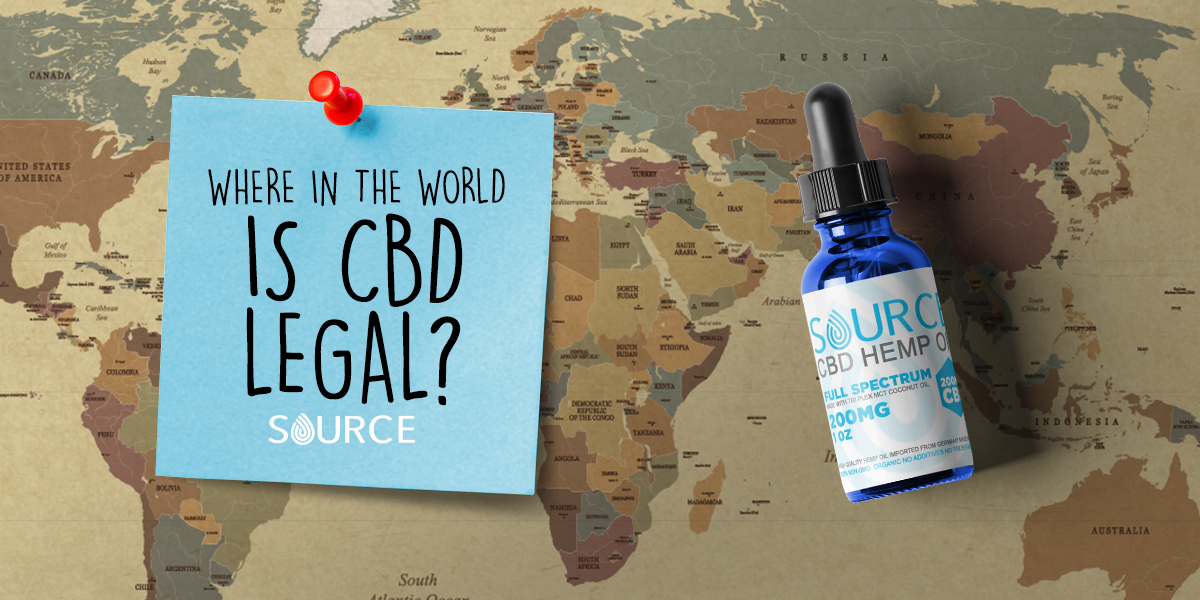CBD Oil News
Is CBD Legal on the Global Stage?
With the 2018 Farm Bill, hemp was legalized in the United States. And while some states do still regulate the sale of CBD, it’s legal almost everywhere.
But how do those who live outside the United States fare? Is CBD legal on the global stage?
Is CBD Legal…
Where in the world is CBD legal? If only it were as simple as giving you a list. Of course, that’s not the case. Each country has different laws, and many of those laws are not a simple YES or NO.
These are some of the basics – but remember, these are just basics, and the laws are changing all the time!
In Canada
For our neighbors to the North, both hemp and marijuana are legal for both medical and recreational use. For the most part (different provinces have different regulations), you can buy hemp-derived CBD products across the country at dispensaries without a doctor’s prescription.
South America?
South of us, the laws vary by country. Mexico and Colombia, for example, have made CBD legal and acceptance is growing at an amazing rate.
In Uruguay, both recreational marijuana and medicinal cannabis are legal. In Chile and Argentina, CBD is considered a medical substance and is available with a prescription.
For those in Brazil, CBD has only been licensed for medical use, and in Bolivia, CBD products are illegal.
What About Europe?
According to the general EU law, the consumption of CBD products containing no more than 0.2% THC is permitted. Most countries in Europe allow CBD, either outright, or with some caveats – THC concentration, prescription, in food and drinks, etc.
Most, but not all though. These are a few that seem to prohibit it, mind you, enforcement varies across the board.
- Albania
- Belarus
- Denmark (mostly)
- Iceland
- Serbia
- Russia
- Slovakia
Asia?
Just like elsewhere, the rules on CBD in Asia vary significantly from one country to another. Interestingly, laws are heavily dependent on cultural, traditional, and religious differences.
Here are just a few examples
- Singapore has strict laws against CBD and penalizes the use of cannabis products severely.
- In Japan and Hong Kong, CBD products must not contain any traces of THC.
- Officials in China say it’s legal as long as it follows the THC limit of 0.3%. You can find it in cosmetics but not as a food additive or health food.
- In South Korea, medicinal CBD is available under government control.
- Cannabis in Indonesia has been banned since 1927 and all of its derivatives are illegal – that includes CBD.
India seems to be the most ahead of the curve. Low-THC CBD oil made from hemp can be purchased and used in India. The licensed sale of cannabinoids is permitted under the NDPS Act, the Drugs and Cosmetics Act.
CBD in the Middle East?
In many Middle Eastern countries, CBD is banned outright. And regulation and penalties may be harsh.
It is banned completely, full stop, in these countries:
- Afghanistan
- Bangladesh
- Bhutan
- Iran
- Iraq
- Kazakhstan
- Kuwait
- Lebanon
- Pakistan
- Qatar
- Saudi Arabia
- Sri Lanka
- Tajikistan
- The United Arab Emirates
One country that does permit it, although technically only for medicinal use, is Israel.
Israel is actually the world leader in CBD research and development, but it does regulate the cannabinoid strictly. Until 2018, CBD was available only to patients with a medical permit directly from the ministry. In 2018, the health authority changed its stance, permitting public service physicians to issue licenses and monthly prescriptions for medical cannabis. Several government-licensed pharmacies now sell medical CBD as well.
Africa?
The legal status of CBD in Africa is harder to determine. Most countries don’t have any regulations (but that does not mean it’s legal – just that there are no specific regulations). Others strictly limit it.
The country with the most clearly defined (and relaxed) status is South Africa, where, in 2019, the Health Minister amended the country’s Medicines and Related Substances Act to remove certain cannabidiol preparations for non-serious health claims. The change to South Africa’s medicines law means the country is the first in Africa to carve out a federally approved market for non-prescription CBD.
How about Australia and New Zealand?
In Australia, the government regulates CBD as a controlled substance under poison and drug laws. The cannabinoid falls under the medical cannabis program. CBD is legal as long as the content of other cannabinoids (including THC) doesn’t exceed 2%. You can get CBD via an authorized prescriber.
In New Zealand, CBD is classified as a prescription medicine under the Medicines Act 1981. As with Australia, it’s only available by prescription from an authorized prescriber, but patients are allowed to import it as long as falls within legal THC limits (2%).
Where is CBD Legal: Final Thoughts
Depending on where you live, you may have easy access to CBD. And that’s awesome. For those in areas where CBD is not legal, or where access is difficult, our hope is that this will soon change!
Additionally, while most of us may not be traveling right now, when travel resumes, if you’re planning to travel with CBD products, do some research beforehand. Make sure that your carry-on doesn’t contain something that can land you in legal hot water.

